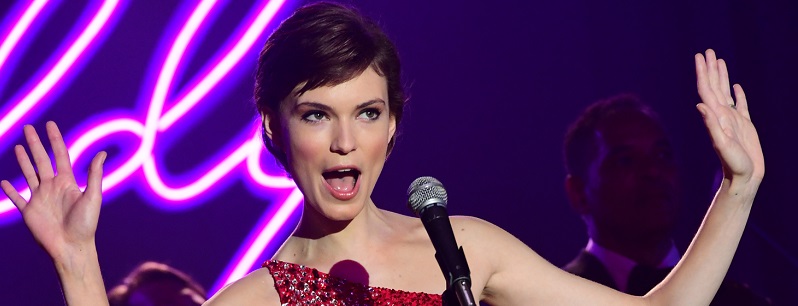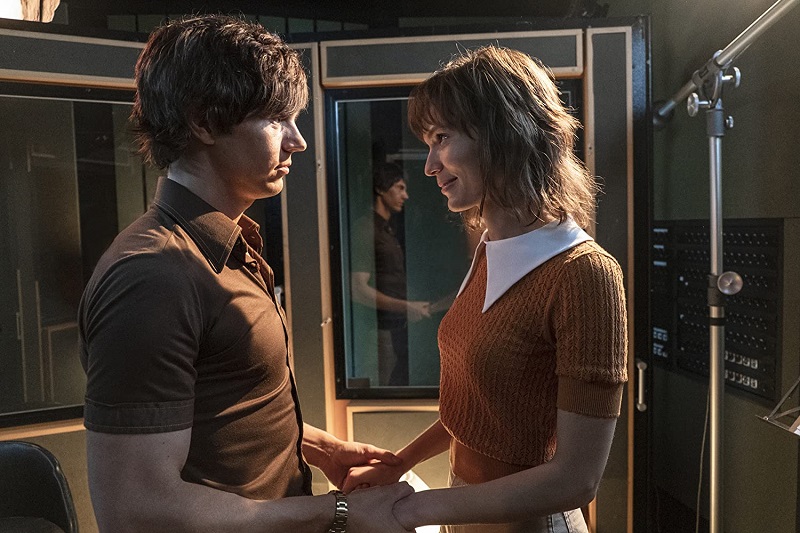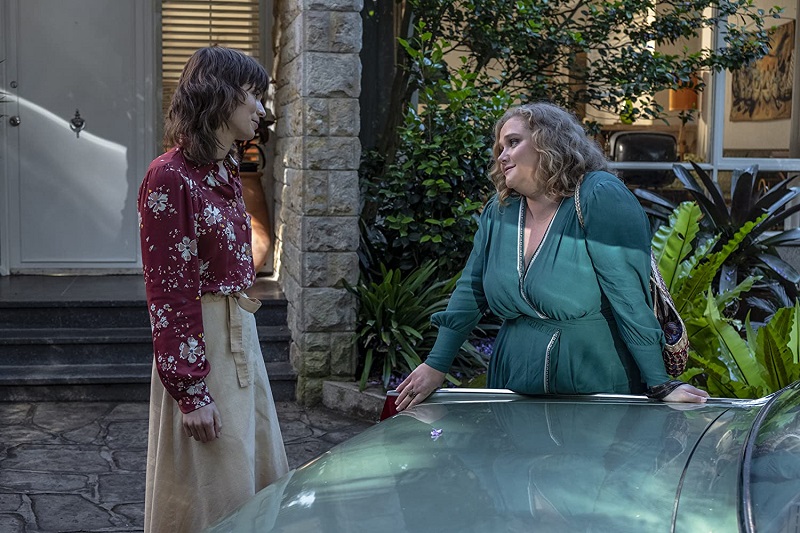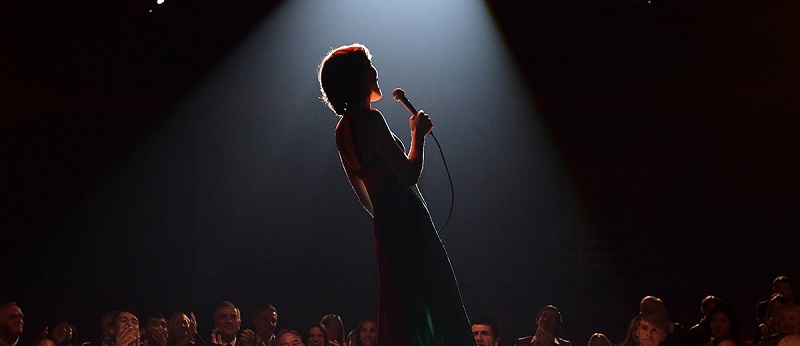It is beyond fitting that the Helen Reddy biopic, I Am Woman, is not only helmed by a fellow Aussie, Unjoo Moon, but also a female director whose vocational opportunities were fostered by a social movement whose musical theme song is the empowering film’s moniker.

Tilda Cobham-Hervey (Hotel Mumbai) earned the role of a lifetime. It’s clear that she keenly understood the importance of the film. Every note had to be impeccable and every movement radiantly Reddy. Whoever scored the part had to possess, to their core, a laser-sharp understanding of what innately drove the Grammy winner to immense success as well as playing a seismic part in sweeping social change utilizing the voice of an angel. The fellow Australian dove into the life of Reddy with a passion and verve that pops off the screen, sonically and emotively.
Reddy left her Down Under confines in 1966 after winning an Australian singing competition, Bandstand, whose prize was a recording contract with Mercury Records in New York City. She packed up her life, her three-year-old daughter Traci, and headed to the city that doesn’t sleep. Upon arrival, she was told by Mercury record executives that no one wanted to listen to a female voice at the current time. With a return ticket to Australia tucked at the ready, Reddy instead dug in her heels and sang anywhere that would pay her—even if her all-male band repeatedly made more cash than she did.
Soon after her arrival, she became friendly with two people who would change her life, trailblazing rock and roll writer Lilian Roxon (Danielle Macdonald)—also from the land Down Under—and Jeff Wald (Evan Peters), a talent agent. The former would inspire her to keep fighting and the latter… she would fall in love and marry. In addition to becoming her husband, Wald also served as her manager and insisted a move to Los Angeles was the key to success. He wasn’t wrong.
As portrayed in I Am Woman, the relationship between Lilian and Helen is a kinship that we all should be so lucky to have in our lives. Screenwriter Emma Jensen has impeccably captured a female friendship between these two that is so endearingly supportive. Lilian would pen the liner notes to Helen’s first album and the singer’s encouragement of her gifted writer/BFF would result in a literary first. She penned the first and completely comprehensive Rock Encyclopedia. Too often, women in film are portrayed as being in competition with one another. It is a breath of fresh air to witness a friendship that is so mutually respectful.
Jensen had a tricky task when portraying Reddy’s husband. Yes, he knocked on doors to record companies across Los Angeles (often at her urging as he was busy managing folks like Deep Purple and Alice Cooper). But he also took an archaic attitude towards marriage and had a chronic cocaine problem. That addiction slowly, but surely, altered his personality with deep mood swings that involved rage. That doesn’t sound like the greatest guy in the world, but as this is a true story, the screenwriter cannot write “around” the issue. It is important though, that we still must have a shred of affinity for this guy as he was the father of Reddy’s second child and her husband/manager who played an integral part in her meteoric rise (when she finally was given the chance). ‘
As inhabited by the X-Men: Days of Future Past scene-stealer, Wald is humanized in a manner that effectively captures what it means to be on coke for decades. It progressively alters people. Jensen did a lot of things well with her script, but none quite as impressive as the character arc of Reddy’s other half during this time period.
After pushing her husband tirelessly and not taking “no” or “I’ll do it later” for an answer, there is finally a payoff—she was signed to record an album for Capitol. Her song I Don’t Know How to Love Him hit the American top 20 and went all the way to number two in her native Australia.
As beautifully captured in her biopic, the social landscape found millions of women taking to the streets and statehouses, empowered by the Equal Rights Amendment (ERA) campaign. They, in turn, were further spurred by Reddy and the song that would define her.

Reddy also was a trailblazer in how she sat in a room full of male record executives who were insisting that the music listeners of the early 70s only wanted to her male singers. The electric Aussie responded with a piercing retort, “Has anyone asked women who they want to listen to?” It seems like an obvious response, but it was hardly a given before the women’s movement moved the needle on social norms in America. As Moon weaves her cinematic tapestry, Reddy was a sponge overflowing from a perfect storm of elements. After that fateful meeting, the artist put pen to paper.
“I am strong. I am invincible. I am woman,” she wrote, and the rest was history.
As is the case with many musical biopics, the vastness of the subject’s success surprises. For example, I am a huge Queen and Elton John fan. Yet, when Bohemian Rhapsody and Rocketman hit screens the mind-blowing number of hits they scored became impressively real. These films have a way of effectively illustrating just how prolific these musicians are—something not seen quite as much with today’s musical landscape. As spotlighted in I Am Woman, Reddy released 18 albums, seven of which went Gold. Her greatest hits package went double platinum. She had 24 hit singles, with eight going to the top of the charts.

The Australian actress went deep with her portrayal of the singing superstar. Cobham-Hervey not only captured Reddy’s tenor and cadence, but the little things that take a rich performance and elevate it to one that resonates across the globe. Being in every single scene for any thespian is simultaneously a dream and a source of immeasurable pressure. The entire film hangs on her shoulders. She could not have been more prepared.
In my exclusive interview with Moon, she reported that Cobham-Hervey had an entire year to prepare for the part. She took voice lessons, movement coaching and made herself continually available for makeup, costume, and hair tests that further embedded her into becoming the songstress. It shows on every single frame. Her performance is so riveting and commanding that it will bring countless folks into the Reddy appreciation society. Many of these viewers might never have even considered listening to her recordings prior to I Am Woman.
Have YouTube and Spotify at the ready for more Reddy when those credits roll at the conclusion of I Am Woman.
Moon exhibits a supreme command of storytelling that rivals directors with twice her experience. There’s an innate sensitivity that permeates every moment that, dare I say it? could only have come from a female helmer. One doesn’t have to share gender to understand the struggle that someone like Reddy went through. But it doesn’t hurt, either. In fact, one could argue that being a female director in a business that is overwhelmingly male mirrors what Reddy went through in the music business decades prior. The South Korean born, Australian raised helmer also balances the musical and dramatic elements effortlessly. Too often in films of this ilk, cramming the artist’s biggest music moments can derail the narrative and thus, the emotive connection, between audience and biopic subject. That is not even remotely the case in I Am Woman as the musical performances reinforce that emotional tether between film and viewer.

There’s another knock on musical biopics in that they can drown on their own excellence in terms of scope. Charting that many hits and recording all those albums, as well as having her own television summer series (The Helen Reddy Show) and film work (Airport 1975, Pete’s Dragon), a tale-teller might have been tempted to lay it all out there, regardless of running time. With the talent tandem of Moon and Jensen, decades of Reddy come together entertainingly, enlighteningly, and yes, efficiently.
Grade: B+

